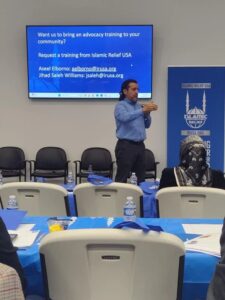On December 11th and 12th, Islamic Relief USA (IRUSA) hosted its annual Food Insecurity Conference, bringing together a diverse group of stakeholders to address the critical issue of hunger and its impact on communities across the nation and worldwide. The event was a resounding success, filled with insightful discussions, collaborative brainstorming, and a renewed commitment to tackling food insecurity head-on.
A Glimpse into the Conference
 The conference kicked off at the IRUSA’s headquarters with keynote speeches by prominent figures such as Anwar Khan the IRUSA Co-Founder & President, Araif Yusuff the IRUSA Interim CEO, Jihad Saleh Williams the IRUSA’s Senior Advisor for Advocacy & Government Relations, Alberto Gonzales, Jr.-USDA’s Senior Advisor for External Engagement-Food and Nutrition Service (FNS), Dr. Shariq Siddiqi the Assistant Professor of Philanthropic Studies & Director of the Muslim Philanthropy Initiative-Lilly Family School of Philanthropy, and David Hawa the IRUSA’s Director of Marketing-Marketing Department. in the field of food security and advocacy–shedding light on the complexities of the issue and the urgent need for innovative solutions. Panel discussions throughout the two days explored various aspects of food insecurity, including its root causes, impact on vulnerable populations, and promising strategies for achieving long-term food security.
The conference kicked off at the IRUSA’s headquarters with keynote speeches by prominent figures such as Anwar Khan the IRUSA Co-Founder & President, Araif Yusuff the IRUSA Interim CEO, Jihad Saleh Williams the IRUSA’s Senior Advisor for Advocacy & Government Relations, Alberto Gonzales, Jr.-USDA’s Senior Advisor for External Engagement-Food and Nutrition Service (FNS), Dr. Shariq Siddiqi the Assistant Professor of Philanthropic Studies & Director of the Muslim Philanthropy Initiative-Lilly Family School of Philanthropy, and David Hawa the IRUSA’s Director of Marketing-Marketing Department. in the field of food security and advocacy–shedding light on the complexities of the issue and the urgent need for innovative solutions. Panel discussions throughout the two days explored various aspects of food insecurity, including its root causes, impact on vulnerable populations, and promising strategies for achieving long-term food security.
Participants actively engaged in discussions, sharing their experiences, challenges, and best practices in addressing food insecurity. From community leaders to government officials, researchers to activists, a collaborative spirit pervaded the conference, fostering a sense of shared purpose and a commitment to collective action.
Highlighting Key Takeaways
Several key takeaways emerged from the conference:
- The need for a multi-pronged approach: Addressing food insecurity requires a holistic approach that tackles the issue from various angles, including poverty reduction, sustainable agriculture practices, and improved access to education and healthcare.
- Empowering communities: Local communities must be at the forefront of efforts to achieve food security. Empowering them through capacity building, resource allocation, and decision-making power is crucial for long-term success.
- Leveraging technology: Innovative technological solutions, such as digital platforms such as Instagram, Facebook, X (Twitter), etc. can play a significant role in enhancing food security efforts.
- Collaboration is key: Achieving food security requires collaboration and partnerships among diverse stakeholders, including governmental and non-governmental organizations, faith-based institutions, private businesses, and communities themselves.
Moving Forward:
The conference concluded with a renewed sense of urgency and optimism. Participants left empowered and inspired, armed with valuable insights, and strengthened partnerships to contribute to a world free from hunger. As IRUSA continues to spearhead efforts in the fight against food insecurity, the impact of this conference will undoubtedly be far-reaching, rippling through communities and inspiring action around the globe.
Addressing Health Disparities: A Parallel Journey
While the Food Insecurity Conference shines a light on a critical national issue, its emphasis on holistic well-being echoes deeply in the ongoing battle against health disparities in California’s North Bay region. In Solano and Sonoma Counties, where CHMRC works, residents face daunting odds in achieving optimal health. This struggle stems from disparities rooted in fundamental social determinants like poverty, education, and housing.
In Solano, a staggering 8.9% and 6.4% in Sonoma live below the poverty line, yet both numbers paint a grim picture. These disparities manifest in increased suffering, diminished quality of life, and even premature death.
Underlying these disparities lie interwoven challenges. Low-income communities often lack access to fresh produce and safe spaces for exercise, contributing to chronic diseases like obesity and diabetes. Culturally competent healthcare, crucial for addressing mental health and substance abuse issues that disproportionately affect certain communities, remains unaffordable or unavailable, leaving problems untreated and further jeopardizing overall well-being.
Bridging these disparities requires a comprehensive approach that tackles the root causes. From expanding access to healthy food and culturally competent healthcare to strengthening social services and promoting education, a multi-pronged effort is needed. Only then can we create a more equitable future where every resident of Solano and Sonoma Counties can pursue optimal health and well-being.
Beyond the Conference
While the conference provided a valuable platform for discussion and collaboration, the fight against food insecurity is a continuous journey. The conference encouraged the participants to stay informed, get involved in local initiatives, and support organizations like IRUSA that are working tirelessly to ensure everyone has access to the nutritious food they need to thrive.
Together, we can build a future where hunger is a relic of the past.

 The Bloomerang Network
The Bloomerang Network